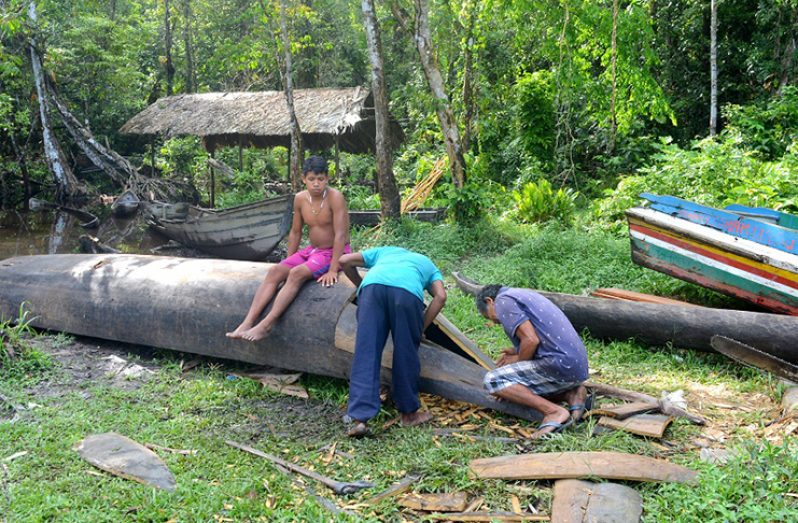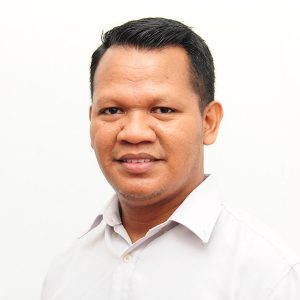–out west, where Español is now the lingua franca
Story and photos by Alva Solomon
SURVIVAL of the fittest is considered the buzzword of the moment at Gaja Landing on the outskirts of White Water village in the North West District, where dozens of Venezuelan migrants have taken up residence as the economy in the neighbouring country dwindles daily.
The “landing” is a hot-spot for traders in various food items such as rice and other staples from both sides of the border. Venezuelans sell almost anything of value to eek out a living.
“We are helping them from a humanitarian standpoint,” says new White Water toshao, Ernest Samuels.
Small huts, cleared parcels of lands for housing, and the provision of medical care almost daily at the health post in the village tell of the struggle of the migrants, many of them Warraus, seeking a better way of life on this side of the border. Other Venezuelans, including those from the states outside of Caracas, have found small jobs around the Mabaruma sub-region, like painting and carpentry.
Toshao Samuels told the Guyana Chronicle that on entering White Water from the western border, the migrants first report to the Council and provide it with vital information such as their names and other relevant data.
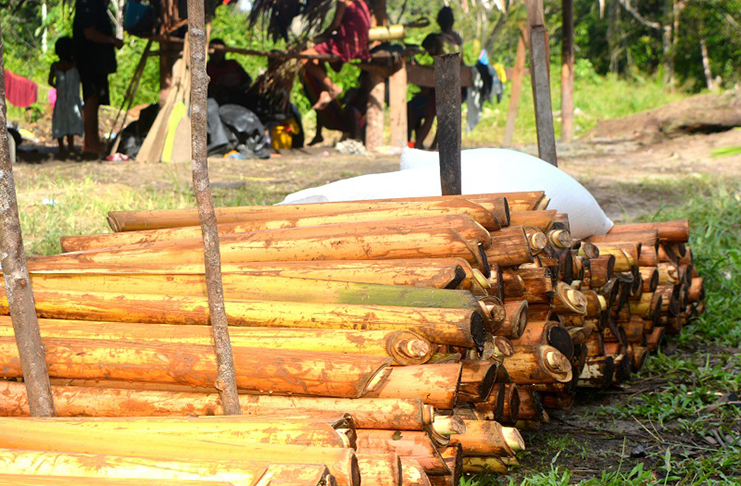
Their next stop, he said, would be the police station established at the location. There’s also a Guyana Defence Force (GDF) post at the centre of the village, which was established several months ago so as to ensure proper security arrangements are in place.
A stable number of 328 persons have moved to the community permanently since 2017 and periods of 2016, but according to Samuels, there are many who would just come weekly to buy ration or to trade items such as fish. And there are those who would come in search of the odd job from time to time.
He said two councillors would keep him abreast of what is happening regularly, and that the village has even had to bend some of its by-laws to help out the situation.
“They needed a place to stay, and we have community by-laws; but we had to flex those laws and see how we can help, because they need it,” Samuels said, adding that vacant lands have been checked and green-lighted in parts of the village for the migrants to occupy.
THERESA’S STORY
Theresa Daniels, a mother of nine, lived in Venezuela for almost 12 years. When the Guyana Chronicle caught up with her, she was busy hanging clothes to dry in her yard as her grandchildren played nearby. A small fireside with smoking embers stood next to the family’s home.
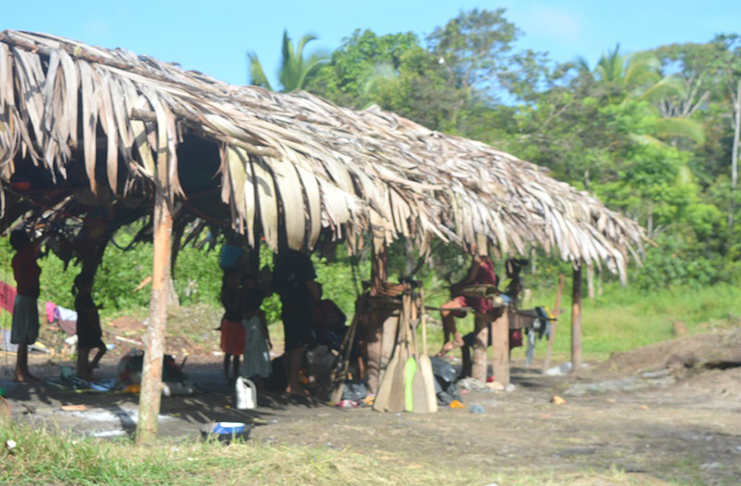
Daniels recounted that when she and her family moved to Venezuela, “things were very nice that side.” But the situation took a drastic turn when Chávez died and his successor, Nicolás Maduro took office. “We start to suffer with the schoolchildren, the food price; things get slow after a while,” Theresa said.
She and her husband decided to return to Guyana in 2017; and pretty soon, some of the children followed, bringing with them their children. Five of her children are still in Venezuela, she said, but the others have opted to relocate here permanently.
As to how badly the price increase is affecting Venezuelans, Theresa said: “When I left that side, it was Bs150 for one kilo rice; and now it get worse because my children can’t even buy a kilo.”
“Me glad bad fuh come back here, because meh mother from this side, and me got roots here, so this is home.”
As we headed further west to the border along the part rugged, part hilly terrain of meandering sandy road, the evidence was clear that the village’s population was on the increase, as many makeshift homes could be seen in various stages of construction.
Many are native Guyanese who are returning to Guyana after living several decades on the other side of the border, while others are venturing here for the very first time.
One such family is that of Rosalinda and Victor Mercano and their four-year-old son. They’ve set up house in a small thatch-roofed structure which they are still working on. Rosalinda told the Guyana Chronicle, via a translator, that they made the move all the way from Cumaná, in Sucre, some 250 miles from the Venezuelan capital, Caracas.
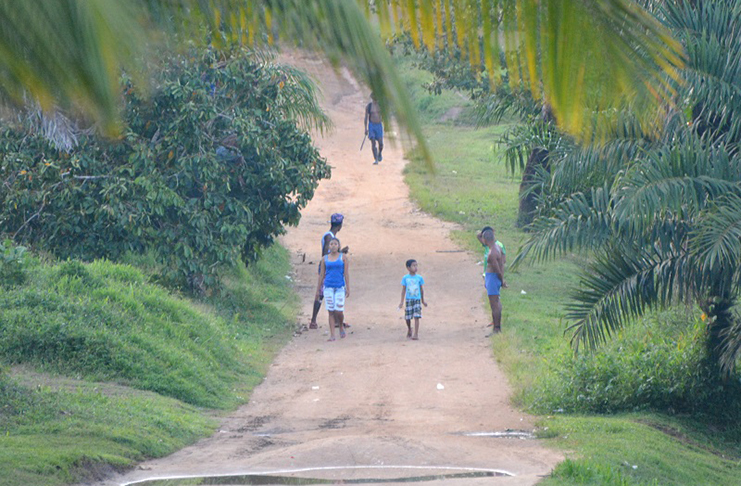
Victor, who’s 26, speaks only Spanish, but he’s hoping he could find a job here. He explained that after leaving school, he started working in the fishing industry, but after a few years, things got pretty rough.
Rosalinda, who’s 23 and speaks a little English, said she has relatives here in Guyana. She said that both she and her husband are hoping they can find jobs, and quickly, so they can live more comfortably.
ASSISTANCE WELCOME
They said they’re willing to accept any form of assistance, but unfortunately, they have no mobile phone. White Water residents have, however, promised that they would make contact with the young family should they hear of anything.
Rosalinda, who is optimistic that things will work out fine, said that come what may, their son will be attending school come September 3, when schools across Guyana re-open.
As we headed still further west to Gaja Landing, a prime spot for trading, there was no mistaking that the area has been a hive of activity in recent months when compared to back in 2016 when the Guyana Chronicle last visited.
As one negotiates the trail of planks across the swampy marshland to get to the “landing” proper, several houses can be seen in the distance. On arrival, we met a mother sitting in a hammock and rocking her week-old baby.
According to a community health worker from White Water Village, the woman gave birth just last Saturday around 05:00hrs, and she and her husband are contemplating naming the baby “Guyven,” short for Guyana-Venezuela.
As the afternoon progressed down at the “landing”, several men were seen busy repairing the bow of a canoe, blithely unaware of the trail of ants crawling nearby.
Not far from them, a woman was busy making craft items for retail, while stacks of manicole from the heart-of-palm tree lay nearby.
Word is that the migrants have been harvesting the manicole to sell it to traders who would pay them handsomely for the commodity. We also learnt that some make money, as much as G$300 per trip, by ferrying heavy items such as bags of rice on their backs across the marshy wooded track. According to migrants, the situation in Venezuela is becoming dire with each passing week, so they’re hoping that their fortunes would change this side of the border.
The Guyana Government has been addressing the issue by distributing food items and other supplies to assist the migrants through various organisations such as the Civil Defence Commission (CDC).
The Regional Democratic Council of Region One (Barima/Waini) is also doing their bit to alleviate the situation.
A temporary settlement is being considered for establishment on the outskirts of Mabaruma.



.jpg)






